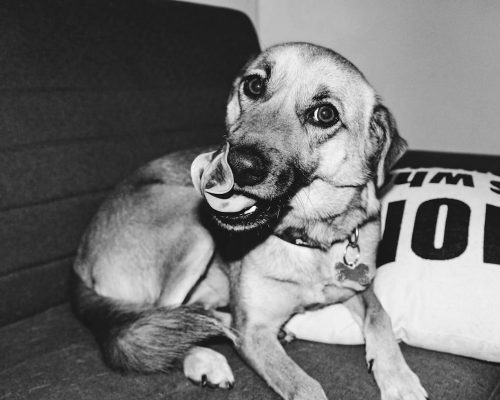Yes, dogs dream. It is not an uncommon phenomenon that several dog owners have come across: seeing their dogs quivering in their sleep.
As dog owners, it’s natural to wonder what goes on in our furry friends’ minds when they drift into slumber. Have you ever noticed your dog twitching, quivering, or even softly barking while sleeping?
These behaviors can be intriguing, but they also raise questions. Do dogs dream like humans? Why do they quiver in their sleep?
This article dives deep into the science of canine sleep, the reasons behind these movements, and what it all means for your dog.
Table of Contents
ToggleThe Science of Sleep in Dogs
Like humans, dogs go through sleep cycles that include both light and deep sleep stages. Understanding these cycles is key to figuring out why dogs twitch or quiver when they snooze.
- Non-REM Sleep: This is the lighter phase of sleep where the body begins to relax and recover.
- REM Sleep: REM, or Rapid Eye Movement, is the deeper phase where dreams occur. During this stage, the brain becomes highly active, even though the body remains mostly still.
Dogs, especially those who lead active lives, spend about 10-12% of their sleep time in REM sleep, which is when the magic of dreaming happens.
Do Dogs Dream? The Evidence
Yes, dogs do dream! Scientific studies show that dogs exhibit brain activity similar to humans during REM sleep.
- Researchers using EEG scans have found that dogs’ brainwave patterns mimic those of dreaming humans.
- During REM sleep, dogs may act out their dreams through twitching, vocalizations, or paw movements.
- Puppies and younger dogs dream more frequently because their brains are still developing and processing new information.
What Do Dogs Dream About?
While we can’t know for certain, experts believe dogs dream about experiences from their waking hours:
- Playing fetch or running in the park.
- Chasing other animals, like squirrels or birds.
- Spending time with their owners and reliving moments of excitement or joy.
Essentially, dogs replay their day’s adventures, just as humans often do.
Why Do Dogs Quiver or Twitch in Their Sleep?
Quivering, twitching, and slight movements during sleep are normal behaviors in dogs. These actions are most prominent during REM sleep, where the brain is actively reliving experiences.
- Motor Neuron Activity: During REM sleep, some motor neurons remain active, causing small, involuntary muscle contractions.
- Dream Movements: If your dog is dreaming of running or playing, their paws may move as if they’re acting out the dream.
- Muscle Relaxation: As muscles relax, occasional twitches or quivers can occur, similar to how humans experience muscle spasms while sleeping.
Is It Normal or Concerning?
Normal sleep movements are harmless. However, intense shaking, rigid muscles, or distress signals during sleep could indicate a seizure or other medical issue.
Barking, Whimpering, and Other Sleep Sounds
It’s common for dogs to make noises while they sleep, such as:
- Soft Barks or Growls: Indicate excitement or tension within a dream.
- Whimpering or Crying: Your dog may be dreaming about something stressful or emotional.
- Sighing or Snoring: These sounds are typical and occur as the body fully relaxes.
If these noises seem gentle, there’s no need to worry. However, loud or distressed sounds warrant closer observation.
Can Dogs Have Nightmares?
Yes, dogs can have nightmares. Just like humans, dogs may experience bad dreams, often related to stressful or frightening events they’ve encountered.
Signs Your Dog Is Having a Nightmare:
- Whimpering or crying loudly.
- Intense twitching or paddling of the paws.
- Waking up abruptly and appearing disoriented or scared.
If you notice these behaviors, resist the urge to wake your dog abruptly, as it can startle them. Instead, call their name softly to rouse them gently.
Sleep Movements vs. Seizures: How to Tell the Difference
It’s crucial to differentiate between normal sleep movements and seizures, which require immediate attention.
Normal Sleep Movements:
- Gentle twitching of the paws, face, or tail.
- Soft sounds, like barking or whimpering.
- Smooth breathing and relaxed muscles.
Signs of Seizures:
- Intense, uncontrollable shaking.
- Stiff or rigid muscles.
- Foaming at the mouth or drooling excessively.
- Difficulty waking up or remaining unresponsive.
If you suspect a seizure, consult your veterinarian immediately for further evaluation.
Do Dogs Dream About Their Owners?
Given how much time dogs spend with their humans, it’s likely that you appear in their dreams! Dogs are emotionally connected to their owners, and dreaming helps reinforce those bonds.
- Your voice, scent, and presence are strong memories that could replay in their dreams.
- Dogs may dream of shared activities, such as walking, playing, or cuddling.
Why Puppies and Senior Dogs Twitch More
Age plays a significant role in how dogs sleep and dream:
- Puppies: Their brains are developing rapidly, leading to frequent REM sleep and more vivid dreams.
- Senior Dogs: Older dogs may experience disrupted sleep patterns or twitching due to age-related conditions like arthritis or cognitive decline.
Both are normal, but if movements seem excessive, a vet check is always a good idea.
How to Ensure Your Dog Sleeps Soundly
Promote healthy, restful sleep for your dog with these tips:
- Create a Comfortable Sleep Space: Provide a soft, supportive bed in a quiet area.
- Stick to a Routine: Regular meal times, walks, and bedtime help dogs relax.
- Daily Exercise: Ensure your dog gets enough physical activity to tire them out.
- Mental Stimulation: Puzzle toys and training sessions keep their minds active, promoting better sleep.
- Calm Environment: Avoid loud noises or disruptions during their sleeping hours.
Can Health Issues Cause Excessive Quivering?
Occasionally, excessive twitching or shaking can signal an underlying health issue, such as:
- Pain or Injury: Muscle spasms due to strain or injury.
- Neurological Disorders: Conditions like epilepsy may cause unusual movements.
- Nutritional Deficiencies: Lack of calcium or other essential minerals can affect muscle function.
If your dog’s sleep movements seem abnormal, consult a veterinarian for a thorough checkup.
Understanding Dog Dreams and Sleep
Dogs, much like humans, experience vivid dreams during REM sleep. Quivering, twitching, or soft sounds during their sleep are usually normal signs that your dog is reliving their day’s adventures.
Whether they’re dreaming of chasing a ball, exploring the park, or spending time with you, these sleep behaviors reflect a healthy and active brain.
By understanding why dogs quiver in their sleep and how dreams play a role in their lives, you can better appreciate the unique and mysterious world of your canine companion.
Keep an eye on their sleep habits, provide a comfortable environment, and cherish the adorable moments when they “run” in their dreams—it’s all part of being a happy, healthy dog.






